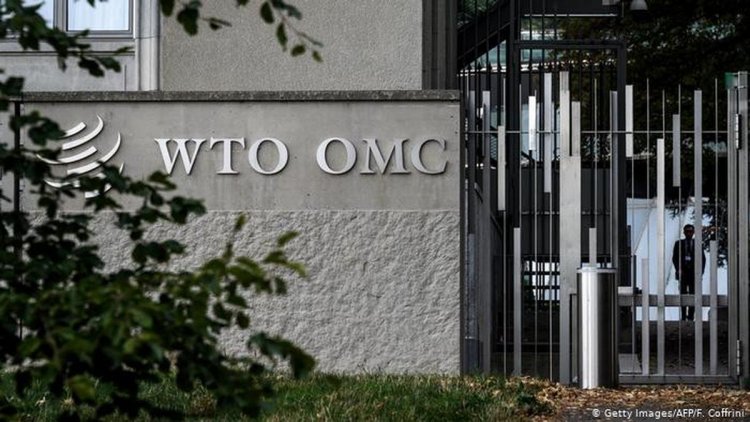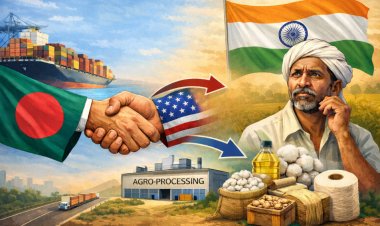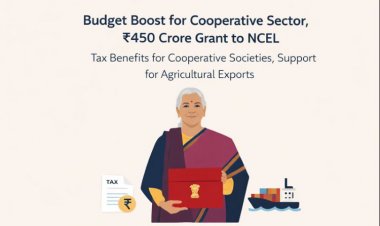Swadeshi Jagran Manch Slams US Tariffs, Calls for WTO’s Dissolution
In a statement, Dr. Ashwani Mahajan, the National Co-Convener of the organization, said, "US has violated WTO rules earlier too; but this time scale of violation is much bigger, as Trump has imposed high reciprocal tariffs on one and all."

Criticizing the United States' new reciprocal tariffs as a violation of World Trade Organization (WTO) rules, the Swadeshi Jagran Manch has said that the time has come to dump the WTO itself. In a statement, Dr. Ashwani Mahajan, the National Co-Convener of the organization, said, "US has violated WTO rules earlier too; but this time scale of violation is much bigger, as Trump has imposed high reciprocal tariffs on one and all." It is worth noting that U.S. President Donald Trump announced the tariffs on April 2, 2025. Under the new policy, India faces a 26% tariff - meaning all goods exported from India to the U.S. will be subject to a 26% import duty.
Dr. Mahajan added that India and other countries have levied import duties based on their WTO commitments. When the WTO was established, all member nations agreed on a cap for import duties, known as "bound tariffs." For India, the average bound tariff is 50.8%. However, in practice, India imposes an average applied tariff of just around 6%, significantly lower than the bound limit.
He emphasised that this shows India has complied with global trade norms, whereas the U.S. has repeatedly disregarded them. With such blatant violations now becoming routine, Mahajan argued, "it is time to reconsider the relevance of the WTO itself."
He said, it has to be understood that not President Trump’s complaint, that Bharat imposes high duties on goods coming from USA, is not a legitimate complaint, as those countries impose import duty within the limits of their bound tariff as per WTO rules, which are in accordance with the agreements made earlier. Here it is important to understand that why did America accept the imposition of high import duty by other countries in the earlier GATT agreements?
The statement ays, before the birth of WTO, various countries used to impose ‘Quantitative Restrictions’ (QRs) also, in addition to import duties to protect their industries in their respective countries. Along with this, various countries used to impose many types of restrictions on foreign capital also, to protect their industries. USA and other developed countries wanted that India and other developing countries should reduce their import duties and stop using QRs so that their goods can be exported to these destinations, unhindered. Along with this, they also wanted that developing countries should allow the capital of developed countries to enter their countries, change their intellectual property laws, agree to agreement on agriculture, and allow services to be a part of trade negotiations. Developing countries were not ready for all this. In such a situation, developed countries allowed developing countries to impose higher import duties so that they would agree to new demands from developed countries. In such situations, when developing countries were permitted to impose higher import duties, it was not a charity, but a bargain. In such a situation, if the US administration now says that India is imposing higher duties than US, their argument is not legitimate one.
In fact, President Trump is denying the very existence of WTO. The imposition of unilateral tariffs by the US is against both the rules and spirit of the WTO. World Trade Organization has been a powerful organization and the agreements made in it are legally binding. In such a situation, the announcement of unilateral tariffs by the US signifies the end of the WTO.
He said, now that we are witnessing a complete disregard for the WTO, it is time to think afresh about the agreements on TRIPS, TRIMS, services and agriculture in the General Agreement on Tariffs and Trade (GATT). It is worth noting that the agreement on TRIPS has caused us huge losses in terms of royalty expenditure, apart from negative impact it had a on public health. Royalty expenditure by India, which was less than a billion US dollars, in 1990s, has now become more than US $ 17 billion annually.
Due to the WTO and its so-called rule-based international trade system, Bharat has been a victim of unfair trade practices such as dumping by China and unfair subsidies by the Chinese government and the obligation to grant MFN (most favored nation) status even to a non-market economy like China; unfair competition from subsidized agricultural products from developed countries like the US, heavy royalty outgo by developing countries including Bharat, are just a few examples of how Bharat and other developing countries have been suffering under the WTO.
It has been proved that multilateral agreements, such as WTO are not good for developing countries like Bharat, and Bilateral Agreements are most suited to us, as the same can be inked keeping interests of the nation, with mutual consent with our trading partners. Now the time has come that when developed countries like the US are completely disregarding the WTO, we should think of a strategy to come out of other exploitative agreements including TRIPS in the WTO. Also, after the dissolution of the WTO, it will now be possible to impose quantitative restrictions (QRs). In such a situation, we can make a big effort towards decentralization and employment generation by once again starting the policy of Reservation of products for small industries, to protect our small and cottage industries and help increasing employment opportunities in the country.
Now that President Trump has imposed tariffs on goods across the world, we have to strategize our international trade to take advantage of this situation. There are many sectors that may benefit, as our exports may find new markets in the US, while those from China may suffer due to the high reciprocal tariffs imposed by the Trump administration. Also, as the EU and other countries are coming forward for new partnerships in the global value chain, in sectors like defence, we should promote and support our industries in acquiring foreign markets, post Trump’s tariffs.



 Join the RuralVoice whatsapp group
Join the RuralVoice whatsapp group









































